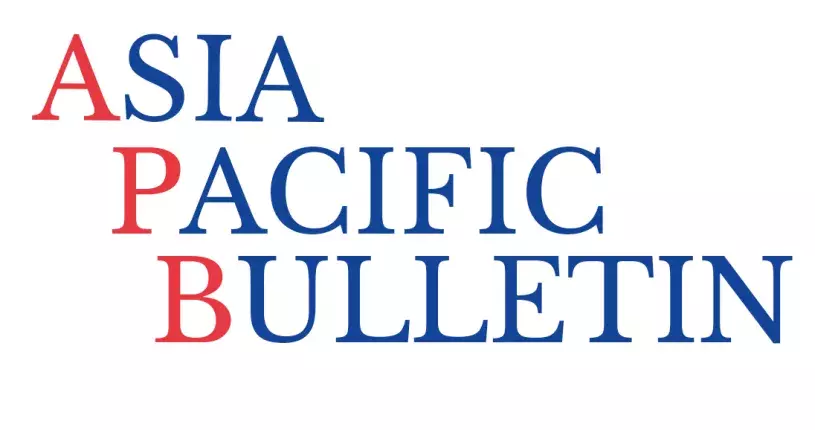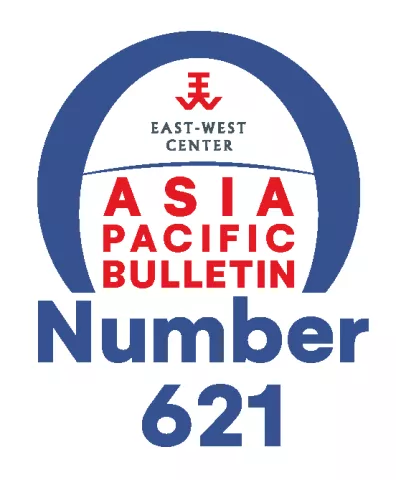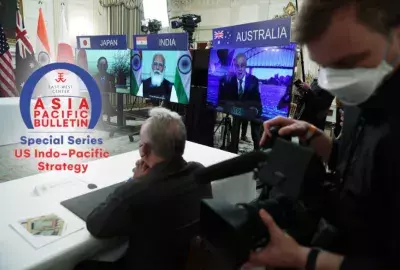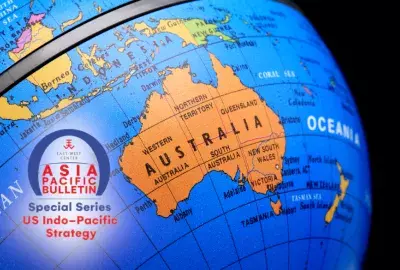Error message


| Yu Inagaki, Research Assistant with the Japan-US Program at the Sasakawa Peace Foundation, explains that Japan is playing a leading role in maintaining the liberal international order (LIO), but questions if it is possible for Japan to maintain the existing order in the face of declining US hegemony and rising challengers. |
| for additional titles in the Asia Pacific Bulletin |
The phrase “rules-based order” has recently become a recurring theme in the Japan-US alliance . This is based on the recognition that the liberal international order (LIO)—which the United States built and maintained, and that Japan has significantly benefited from—is now being challenged. While the war in Ukraine has heightened the sense of crisis over global power dynamics, China has been considered the main threat to the LIO. The United States has identified China as not just a security threat but a “ most consequential strategic competitor and the pacing challenge ,” and Japan has come to view the current international environment from a larger perspective, international order. In fact, Japan has expected to play a leading role in maintaining the LIO as US international engagement weakened under the Trump administration. However, is it possible for Japan, a constrained middle power, to maintain the existing order in the face of a declining hegemon and rising challengers? This raises a classic question in international relations: What will happen to the international order after hegemony; and what can and will Japan, occupying a particular place and role in the international system, be able and willing to do regarding international order?
Japan as the Supply Side for the Order
In hegemonic order, there is a hegemon (supply side) that provides public goods, such as security and economic prosperity, and beneficiary states (demand side) is eroding. Under these circumstances, the United States can no longer deal with China alone, and cooperation with its allies is essential. In response to US entreaties and at the same time to hedge against further US decline, Japan is not only enhancing its own defense capabilities but also strengthening relations with countries other than the United States, such as Australia, India, and Europe. The US alliance system in Asia has been called a hub-and-spoke system without a collective security mechanism like NATO. However, within the current context, the relative decline of the hub, the United States, serves as the impetus for each spoke to strengthen its relationship and support the hub.
Japan has also played a role in maintaining order on the economic front. Under the Trump administration, the US withdrew from the TPP, and even under the Biden administration, it is unlikely to return to the TPP. To deal with that situation, Japan has maintained the framework of this free trade agreement, which was one of the legacies of the Abe administration. It has also worked hard to maintain other multilaterals, such as the trade agreement with the EU and the RCEP. Thus, Japan has played a role in maintaining a system of economic prosperity, one of the major pillars of the US hegemonic order.
The Imbalance between supply and demand
Challenges stem from not only the change of balance of power but also from the imbalance between the supply side (declining hegemon) and the demand side (beneficiary states including Japan). What the United States is now trying to do is to form coalitions with like-minded countries to contest China’s influence. In other words, US strategy has shifted from expanding the LIO globally to once again pursuing a Cold War-type strategy. An example of this shift is the US emphasis on economic security. Given the threat posed by China's state-led economic policy initiatives, such as the development of 5G networks or the production of semiconductors, Washington is working to build supply chains with like-minded countries to prevent Chinese domination of critical technology sectors. Japan has tried to accommodate US interest in trusted supply chains by formulating a new economic security bill. At the same time, the formation of these coalitions is inconsistent with the principles of the liberal economic order. For its part, Japan and other Asian countries want the United States to commit to free trade. Though Washington is trying to promote the Indo-Pacific Economic Framework for Prosperity (IPEF), the Framework does not include the element of economic liberalization. This shows differences between the demand side, which wants US engagement, and the supply side, which focuses on economic security and hesitates to open its market. This inward-looking trend in the US could provide China with economic leverage to attract other countries.
In addition, the issue of values, such as democracy and human rights, makes maintaining order difficult. The United States, especially under the Biden administration, has tended to view competition with China in terms of democracy versus authoritarianism and has taken a tough stance on human rights issues. The Washington-led Summit for Democracy is one example of this more rigid stance. On the other hand, Asian countries, such as the nations of Southeast Asia, do not want values systems imposed upon them by the world’s great powers. Japan also hesitates to see current competition from a values-based perspective and takes a passive stance on human rights issues. Japan's commitment to economic engagement without regard to values is one of the reasons why Southeast Asia highly evaluates relations with Japan. However, as values are hefty concerns for the United States and European countries, there are growing calls for Japan to give human rights greater consideration in its foreign relations. While it may be desirable for Japan to take values more seriously by, for example, adopting the Magnitsky Act, this course of action may negatively impact its reputation within Southeast Asia.
Conclusion
Japan, which has been the beneficiary of LIO throughout the postwar period, now plays a more active role in maintaining the order. However, this is not a simple task of maintaining the existing order. Instead, the task is more complex and involves reconciling the needs of the declining hegemony with those of the many other beneficiary countries. Japan's role as both the supplier and the beneficiary of LIO will have a major impact on what the future order will look like. Similarly, the U.S.-Japan alliance could play an ever more important role in order-building, both to ensure US engagement in the region and to provide public goods.

| Yu Inagaki, Research Assistant with the Japan-US Program at the Sasakawa Peace Foundation, explains that Japan is playing a leading role in maintaining the liberal international order (LIO), but questions if it is possible for Japan to maintain the existing order in the face of declining US hegemony and rising challengers. |
| for additional titles in the Asia Pacific Bulletin |
The phrase “rules-based order” has recently become a recurring theme in the Japan-US alliance . This is based on the recognition that the liberal international order (LIO)—which the United States built and maintained, and that Japan has significantly benefited from—is now being challenged. While the war in Ukraine has heightened the sense of crisis over global power dynamics, China has been considered the main threat to the LIO. The United States has identified China as not just a security threat but a “ most consequential strategic competitor and the pacing challenge ,” and Japan has come to view the current international environment from a larger perspective, international order. In fact, Japan has expected to play a leading role in maintaining the LIO as US international engagement weakened under the Trump administration. However, is it possible for Japan, a constrained middle power, to maintain the existing order in the face of a declining hegemon and rising challengers? This raises a classic question in international relations: What will happen to the international order after hegemony; and what can and will Japan, occupying a particular place and role in the international system, be able and willing to do regarding international order?
Japan as the Supply Side for the Order
In hegemonic order, there is a hegemon (supply side) that provides public goods, such as security and economic prosperity, and beneficiary states (demand side) is eroding. Under these circumstances, the United States can no longer deal with China alone, and cooperation with its allies is essential. In response to US entreaties and at the same time to hedge against further US decline, Japan is not only enhancing its own defense capabilities but also strengthening relations with countries other than the United States, such as Australia, India, and Europe. The US alliance system in Asia has been called a hub-and-spoke system without a collective security mechanism like NATO. However, within the current context, the relative decline of the hub, the United States, serves as the impetus for each spoke to strengthen its relationship and support the hub.
Japan has also played a role in maintaining order on the economic front. Under the Trump administration, the US withdrew from the TPP, and even under the Biden administration, it is unlikely to return to the TPP. To deal with that situation, Japan has maintained the framework of this free trade agreement, which was one of the legacies of the Abe administration. It has also worked hard to maintain other multilaterals, such as the trade agreement with the EU and the RCEP. Thus, Japan has played a role in maintaining a system of economic prosperity, one of the major pillars of the US hegemonic order.
The Imbalance between supply and demand
Challenges stem from not only the change of balance of power but also from the imbalance between the supply side (declining hegemon) and the demand side (beneficiary states including Japan). What the United States is now trying to do is to form coalitions with like-minded countries to contest China’s influence. In other words, US strategy has shifted from expanding the LIO globally to once again pursuing a Cold War-type strategy. An example of this shift is the US emphasis on economic security. Given the threat posed by China's state-led economic policy initiatives, such as the development of 5G networks or the production of semiconductors, Washington is working to build supply chains with like-minded countries to prevent Chinese domination of critical technology sectors. Japan has tried to accommodate US interest in trusted supply chains by formulating a new economic security bill. At the same time, the formation of these coalitions is inconsistent with the principles of the liberal economic order. For its part, Japan and other Asian countries want the United States to commit to free trade. Though Washington is trying to promote the Indo-Pacific Economic Framework for Prosperity (IPEF), the Framework does not include the element of economic liberalization. This shows differences between the demand side, which wants US engagement, and the supply side, which focuses on economic security and hesitates to open its market. This inward-looking trend in the US could provide China with economic leverage to attract other countries.
In addition, the issue of values, such as democracy and human rights, makes maintaining order difficult. The United States, especially under the Biden administration, has tended to view competition with China in terms of democracy versus authoritarianism and has taken a tough stance on human rights issues. The Washington-led Summit for Democracy is one example of this more rigid stance. On the other hand, Asian countries, such as the nations of Southeast Asia, do not want values systems imposed upon them by the world’s great powers. Japan also hesitates to see current competition from a values-based perspective and takes a passive stance on human rights issues. Japan's commitment to economic engagement without regard to values is one of the reasons why Southeast Asia highly evaluates relations with Japan. However, as values are hefty concerns for the United States and European countries, there are growing calls for Japan to give human rights greater consideration in its foreign relations. While it may be desirable for Japan to take values more seriously by, for example, adopting the Magnitsky Act, this course of action may negatively impact its reputation within Southeast Asia.
Conclusion
Japan, which has been the beneficiary of LIO throughout the postwar period, now plays a more active role in maintaining the order. However, this is not a simple task of maintaining the existing order. Instead, the task is more complex and involves reconciling the needs of the declining hegemony with those of the many other beneficiary countries. Japan's role as both the supplier and the beneficiary of LIO will have a major impact on what the future order will look like. Similarly, the U.S.-Japan alliance could play an ever more important role in order-building, both to ensure US engagement in the region and to provide public goods.







